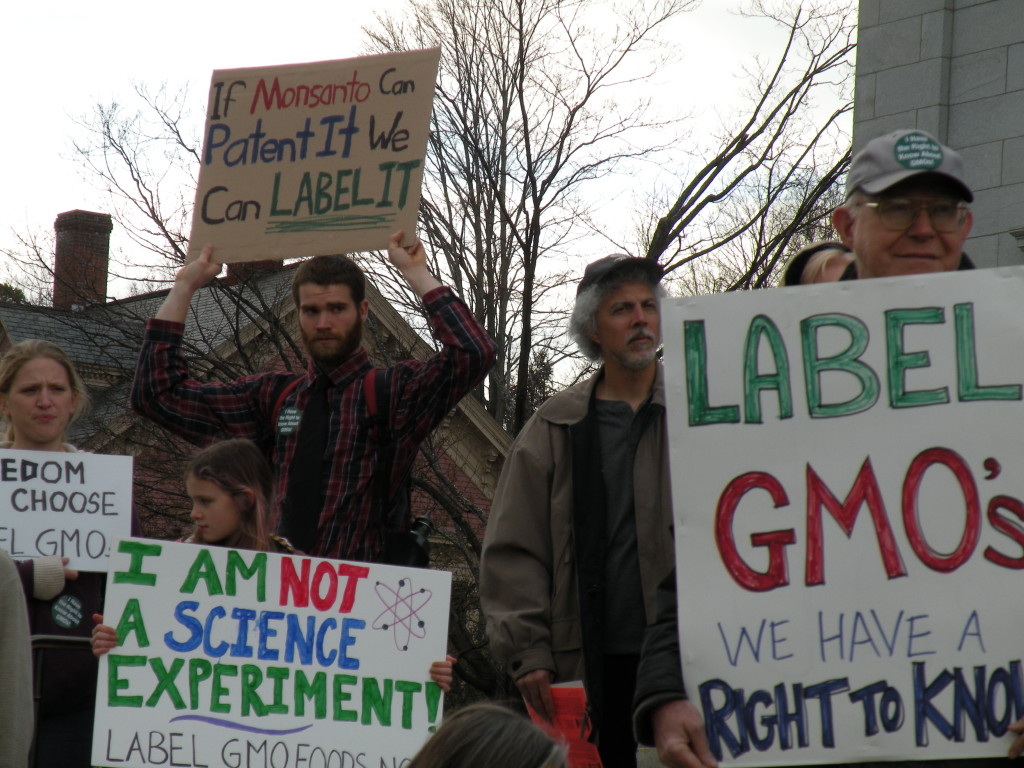With Election Day less than two weeks away, the Vermont Right to Know GMOs coalition, which is a partnership among Rural Vermont, VPIRG and NOFA-VT, has joined forces with similar grassroots efforts in 27 other states and the District of Columbia, which are committed to giving their citizens the right to know what is in their food. The Coalition of States for Mandatory GMO Labeling (The Coalition) has been formed to coordinate state-level efforts to require the labeling of genetically modified foods and to support Prop 37, the California ballot initiative that could mandate GMO labeling in California. The VT Right to Know coalition is rallying the thousands of Vermonters who support GMO labeling to reach out by phone to undecided California voters in support of Prop 37.
Andrea Stander, Director of Rural Vermont, lauded The Coalition of States for Mandatory GMO Labeling saying, “This is about our fundamental right to know how our food is produced. The corporate-led campaign against labeling food that has been genetically engineered represents an enormous threat to the integrity and diversity of our food sources. This multi-state coalition will focus and coordinate the power of ordinary citizens to overcome corporate control of our food system.”
Falko Schilling, Consumer Protection advocate for VPIRG stated, “Millions of consumers across the country have come to rely on common sense labels to tell them what is in the food they buy. Polls consistently show that the vast majority of Americans believe that these labels should let them know whether their food has been genetically engineered. The federal government has turned a blind eye to this issue so we’re working state by state to make sure that consumers are given the facts they need to make informed food purchasing choices.”
Enid Wonnacott, NOFA-VT Executive Director stated, “Vermonters are aware of the longstanding questions and uncertainties about risks that GMO foods may pose to human health and to the environment. They want to know what they are buying and serving to their families, especially when, according to The Center for Food Safety, an estimated 80% of the processed foods on our supermarket shelves contain ingredients made using genetic engineering.”
Last year, 19 U.S. states considered bills to label genetically modified foods. Vermont was among the first and arguably moved its bill, H.722, the furthest with passage by a 9 -1 vote in the House Agriculture Committee. The VT Right to Know GMOs coalition coordinated broad public support for H. 722 gathering over 4,000 signatures in support of the bill & drawing over 400 people to a public hearing with all 112 witnesses testifying in favor of GMO labeling.
Genetic modification (also known as genetic engineering) is the process of inserting genes from one species into another (for example, bacteria genes into corn). Unlike traditional cross breeding, genetic engineering breaches the natural barriers between species. There is a growing body of evidence that the process used to create genetically engineered seeds creates unintended consequences that have yet to be proven safe by the FDA or the United States Government.
As a result of the dramatic increase in production of genetically engineered soybeans, corn, cotton, canola, and sugar beets, it is estimated that over 80% of processed foods on our supermarket shelves now contain genetically engineered ingredients. In the face of that fact, consumer choice is now more important than ever. Zofia Hausman, a British film maker who has traveled extensively throughout the US for a documentary about GMOs, has observed the change in perspectives: “The American consumer has woken up in the last few years and feels unnerved by the smokescreen surrounding our food supply. The demand for transparency is peaking and I would say that The Coalition is a reflection of this. It’s about self-awareness, personal responsibility and choice.”
Over 50 countries throughout the world already mandate GMO labeling, leaving the United States as one of the only industrialized countries in the world that does not mandate GMO labeling. Those who advocate for labeling say this is simply about our fundamental right to know what is in our food and that whether GMOs are safe for human consumption or not is irrelevant when considering whether to label GMOs.
No state has passed a labeling bill yet, but advocates are hopeful that the majority of Californians will vote in favor of Prop 37 in November and pave the way for other states to follow. An industry-backed opposition campaign is currently spending over $1 million per day on efforts to dampen public support for the measure and is currently flooding the airwaves with ads that seek to mislead and confuse California voters.
Pamm Larry, the initial instigator of CA Prop 37 and Northern California Director of Labelgmos.org, stated that, “This Coalition proves that all Americans are concerned about GMOs in our food, not just one state. We, as a nation, want labeling NOW and this coalition is in support of Prop 37 because as California goes, so goes the nation.”
The Coalition of States for Mandatory GMO Labeling includes: Arizona, Arkansas, California, Connecticut, Colorado, Delaware, Florida, Hawaii, Idaho, Illinois, Iowa, Maine, Massachusetts, Minnesota, Mississippi, New Hampshire, New Jersey, New York, North Carolina, South Carolina, Ohio, Oregon, Pennsylvania, Tennessee, Vermont, Virginia, Wisconsin, Washington and Washington DC.

